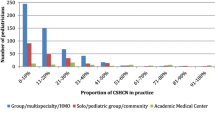Abstract
Primary care providers (PCPs) frequently encounter behavioral health (BH) needs among their pediatric patients. However, PCPs report variable training in and comfort with BH, and questions remain about how and when PCPs address pediatric BH needs. Existing literature on PCP decisions to address pediatric BH in-office versus referring to subspecialty BH is limited and findings are mixed. Accordingly, this study sought to examine parameters and contextual factors influencing PCP decisions and practices related to BH care. Qualitative interview results with 21 PCPs in Maryland indicated that decisions about how and when to address pediatric BH concerns are influenced by the type BH service needed, patient characteristics, the availability of BH services in the community, and possibly PCPs’ perceptions of BH care as a distinct subspecialty. Findings suggest that efforts to support individual PCPs’ capacity to address BH within primary care must be balanced by efforts to expand the subspecialty BH workforce.
Similar content being viewed by others
References
Kataoka SH, Zhang L, Wells KB. Unmet need for mental health care among US children: Variation by ethnicity and insurance status. American Journal of Psychiatry. 2002;159:1548–1555.
Merikangas KR, He JP, Burstein M, et al. Lifetime prevalence of mental disorders in U.S. adolescents: Results from the national comorbidity survey–adolescent supplement (NCS-A). Journal of the American Academy of Child & Adolescent Psychiatry. 2010;49: 980–989.
Wissow LS, Anthony B, Brown J, et al. A common factors approach to improving the mental health capacity of pediatric primary care. Administration and Policy in Mental Health and Mental Health Services Research. 2008;35(4):305–318.
World Health Organization. Child and adolescent mental health resources: Global concerns: Implications for the future. http://www.who.int/mental_health/resources/Child_ado_atlas.pdf. Published 2005. Accessed February 3, 2017.
Cassidy LJ, Jellinek MS. Child and adolescent psychopharmacology: Approaches to recognition and management of childhood psychiatric disorders in pediatric primary care. Pediatric Clinics of North America. 1998;45:1037–1052.
Olson AL, Kelleher KJ, Kemper KJ, et al. Primary care pediatricians’ roles and perceived responsibilities in the identification and management of depression in children and adolescents. Ambulatory Pediatrics. 2001;1(2):91–98.
Kolko DJ, Perrin E. The integration of behavioral health interventions in children’s health care: Services, science, and suggestions. Journal of Clinical Child & Adolescent Psychology. 2014;43(2):216–228.
American Academy of Child and Adolescent Psychiatry (AACAP). A guide to building collaborative mental health care partnerships in pediatric primary care. http://www.aacap.org/App_Themes/AACAP/docs/clinical_practice_center/guide_to_building_collaborative_mental_health_care_partnerships.pdf. Accessed on February 3, 2017.
American Academy of Pediatrics (AAP). Policy statement – the future of pediatrics: Mental health competencies for pediatric primary care. Pediatrics. 2009;124(1): 410–421.
Sayal K. Annotation: Pathways to care for children with mental health problems. Journal of Child Psychology and Psychiatry. 2006;47(7):649–659.
Stein RE, Horwitz SM, Storfer-Isser A, et al. Do pediatricians think they are responsible for identification and management of child mental health problems? Results of the AAP periodic survey. Ambulatory Pediatrics. 2008;8(1): 11–17.
Stein RE, Storfer-Isser A, Kerker BD, et al. Beyond ADHD: How well are we doing? Academic Pediatrics. 2016;16(2):115–121.
Pidano AE, Honigfeld L, Bar-Halpern M, et al. Pediatric primary care providers’ relationships with mental health care providers: Survey results. Child & Youth Care Forum. 2014;43(1):135–150.
Cunningham PJ. Beyond parity: primary care physicians’ perspectives on access to mental health care. Health Affairs. 2009;28(3):w490-w501.
Trude S, Stoddard JJ. Referral gridlock: Primary care physician and mental health services. Journal of General Internal Medicine. 2003;18:442–449.
Kolko DJ. Options for the delivery of mental health services. In: TK McInerny (Ed). American Academy of Pediatrics textbook of pediatric care. Elk Grove Village: American Academy of Pediatrics, 2009, pp. 1168–76.
Salem-Schatz S, Moore G, Rucker M, et al. The case for case-mix adjustment in practice profiling: When good apples look bad. JAMA. 1994;272(11):871–874.
Forrest CB, Nutting PA, von Schrader S, et al. Primary care physician specialty referral decision making: Patient, physician, and health care system determinants. Medical Decision Making. 2006;26(1):76–85.
Dowie R. General practitioners and consultants: A study of outpatient referrals. London: King’s Fund, 1983.
Franks P, Williams GC, Zwanziger J, et al. Why do physicians vary so widely in their referral rates? Journal of General Internal Medicine. 2000;15(3):163–168.
Christensen BO, Sørensen HT, Mabeck CE. Differences in referral rates from general practice. Family Practice. 1989;6(1):19–22.
Williams JW Jr, Rost K, Dietrich, AJ, et al. Primary care physicians’ approach to depressive disorders: Effects of physician specialty and practice structure. Archives of Family Medicine. 1999;8(1):58–67.
Kravitz RL, Franks P, Feldman M, et al. What drives referral from primary care physicians to mental health specialists? A randomized trial using actors portraying depressive symptoms. Journal of General Internal Medicine. 2006;21(6):584–589.
Radovic A, Farris C, Reynolds K, et al. Primary care providers’ initial treatment decisions and antidepressant prescribing for adolescent depression. Journal of Developmental & Behavioral Pediatrics. 2014; 35(1):28–37.
Charmaz K. Constructing Grounded Theory. London: Sage Publications, 2014.
Horwitz SM, Kelleher KJ, Stein RE, et al. Barriers to the identification and management of psychosocial issues in children and maternal depression. Pediatrics. 2007;119:208–218.
Pidano AE, Kimmelblatt CA, Neace WP. Behavioral health in pediatric primary care setting: Needs, barriers, and implications for psychologists. Psychological Services. 2011;8(3):151–165.
Dempster NR, Wildman BG, Duby J. Perception of primary care pediatricians of effectiveness, acceptability, and availability of mental health services. Journal of Child Health Care. 2015;19(2):195–205.
DiCicco-Bloom, B, Crabtree, BF. The qualitative research interview. Medical Education. 2006;40(4),314–321.
Wissow, LS, Zafar, W, Fothergill, K et al. Using vignettes to assess contributions to the work of addressing child mental health problems in primary care. BMC Health Services Research. 2016;15(1):584.
Heneghan A, Garner AS, Storfer-Isser A, et al. Pediatricians’ role in providing mental health care for children and adolescents: Do pediatricians and child and adolescent psychiatrists agree? Journal of Developmental & Behavioral Pediatrics. 2008;29(4):262–269.
Arora PG, Stephan SH, Becker KD, et al. Psychosocial interventions for use in pediatric primary care: An examination of providers’ perspectives. Family, Systems, and Health. 2016;34(4):414–423.
Project Teach. https://www.omh.ny.gov/omhweb/project_teach/ Accessed April 7, 2017.
Gadomski, AM, Wissow, LS, Palinkas, L, et al. Encouraging and sustaining integration of child mental health into primary care: interviews with primary care providers participating in Project TEACH (CAPES and CAP PC) in NY. General Hospital Psychiatry. 2017. https://doi.org/10.1016/j.genhosppsych.2014.05.013.
Madore A, Rosenberg J, Weintraub R. Project ECHO: Expanding the Capacity of Primary Care Providers to Address Complex Conditions. Harvard Business Publishing. 2017. http://www.globalhealthdelivery.org/case-collection/case-studies/north-america Accessed April 7, 2017.
About Echo. University of New Mexico School of Medicine. http://echo.unm.edu/about-echo/ Accessed April 7, 2017.
Guevara JP, Greenbaum PE, Shera D, et al. Survey of mental health consultation and referral among primary care pediatricians. Academic Pediatrics. 2009; 9(2):123–127.
Collins C, Hewson DL, Munger R, et al. Evolving models of behavioral health integration in primary care. New York: Millbank Memorial Fund, 2010. Available online at http://www.milbank.org/wp-content/uploads/2016/04/EvolvingCare.pdf. Accessed on February 3, 2017
Acknowledgements
The authors would like to thank the 21 pediatric primary care providers who participated in this study, as well as Ms. Jennifer Stevenson and Ms. Kristen Wigand for their generous support in preparing this paper for submission. This project was supported by the Maryland Department of Health under grant number 17-17180G.
Author information
Authors and Affiliations
Corresponding author
Ethics declarations
Conflict of Interest
The authors declare that they have no conflicts of interest.
Appendix 1
Appendix 1
ᅟ
Rights and permissions
About this article
Cite this article
Connors, E.H., Arora, P., Blizzard, A.M. et al. When Behavioral Health Concerns Present in Pediatric Primary Care: Factors Influencing Provider Decision-Making. J Behav Health Serv Res 45, 340–355 (2018). https://doi.org/10.1007/s11414-017-9580-9
Published:
Issue Date:
DOI: https://doi.org/10.1007/s11414-017-9580-9






